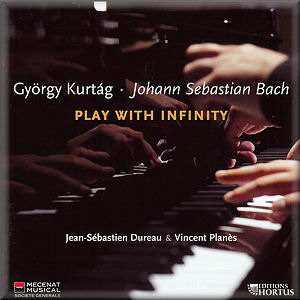 |
 |
|

Buy
through MusicWeb
for £14.99 postage paid World-wide.
Musicweb
Purchase button
|
György KURTÁG
(b.1946) and Johann Sebastian
BACH (1685-1750)
Play With Infinity: Extracts from Játékok
(1979) and Átiratok (Transcriptions,
1973): Play with Infinity [0.55] and [0.52]; Das Alte Jahr vergangen
ist BWV 614 [1.56]; Hommage á Soprani [2.04]; O Lamm Gottes, unschuldig
BWV deest [3.33]; and [3.19] Bells (Hommage ŕ Stravinsky) [1.15];
Herr Christ, der ein’ge Gottessohn BWV 601[1.18]; Sirató [0.49]
Aus tiefer Not schrei; ’ich zu dir BWV 687 [4.17]; Study to Pilinszky’s
Hölderlin’ [1.12]; Allein Gott in der Höh’ sei Her BWV 711 [2.11];
Furious Chorale [0.54]; Gott, durch deine Güte BWV 600[1.06]; Hommage
ŕ Halmágyi Mihály [1.19]; Alle Menschen müssen sterben BWV 643[1.00]
; Les Adieux (in Janáček’s manier) [2.00]; Christe dy Lamm
Gottes BWV 619 [1.02]; Hommage ŕ JSB [1.01]; Dies sind die heil’gen
zehn Hebot BWV 635 [0.51]; Responsorium (To Sir William Glock) [2.14];
Pilinsky János: Keringo (for Zoltan Kocsis) [1.07] and [1.05]; Christum
wir sollen loben schon BWV 611[2.08]; Botladozva (In memoriam Marianne
Reismann) [2.01]; Liebster Jesu, wir sind hier BWV 633 [1.15]; Aus
der Ferne [1.54]; In Memoriam Sebök György [2.41]; Gottes Zeit is
die allerbeste Zeit-Sonatina BWV [2.15]
 Jean Sébastien Dureau and Vincent Planés (piano duet)
Jean Sébastien Dureau and Vincent Planés (piano duet)
rec. 15-18 July 2010, church of Saint Germain de Talloires (Haute
Savoie). DDD
 HORTUS 082 [50.10]
HORTUS 082 [50.10] 
|
|
|
I have in front of me a copy of volume three of György Kurtág’s
Játékok. Its not a great deal of use to me for this volume comprises
almost entirely solo pieces. Kurtág has now produced eight volumes
of these piano pieces (translated ‘Plays and Games’). Nevertheless
it does have as its opening gambit the piece, Play with
Infinity, offered in its solo and piano duet versions.
My volume also has as a piano solo a crawling chromatic piece
called Sirató. The CD includes a massive arrangement
of the piece for the duet team. These books can be thought of
as a modern Mikrokosmos. Indeed one piece is entitled
‘Double notes’ and is described as “an addition to Mikrokosmos”.
These volumes are endlessly fascinating examples of modern piano
repertoire and notational techniques which, although challenging,
are partially didactic.
The accompanying booklet notes are rather waffly but Jean-Marc
Chouvel does astutely remark “Teaching is very important for
the Hungarian musician whose pianistic oeuvre makes explicit
reference to that aspect of his work”. In my volume in the daunting
section ‘Key to the signs used’, Kurtag writes “We should trust
the picture of the printed notes and let it exert its influence
upon us.” He also adds “Pleasure is playing - the joy of movement”.
Dureau and Planés understand this and comment that Kurtág “testifies
to a continual, intimate relationship with his instrument: setting
aside virtuosity, the piano becomes the medium of a fragile
and precious poetic thought”. This implies that each of Kurtág’s
pieces is very brief, often less than a minute – which they
are; just a thought, then passed over.
What makes this CD even more striking is that Kurtág’s ‘thoughts’
are interwoven, often alternating with his arrangements of Bach
chorales from the ‘Orgelbuchlein’ for piano duet. They’re not
just twiddlings but almost recompositions and re-orchestrations.
What seems initially to be stylistically far too disparate -
Kurtág-Bach – blend into an hypnotic whole. This means that
you could play the entire disc, which is not that long, right
through without a break.
Kurtág’s pieces are often mysterious, harmonically atonal and
searching. They use the entire keyboard range with all types
of sounds and techniques. Tempos are often slow as they can
be, quite often, in the Bach chorales. There is however enough
contrast in other ways to retain attention.
Kurtág’s Bach arrangements are intriguing. ‘O Lamm Gottes,
unschuldig’ is highlighted by Chouvel. He remarks that Kurtág
“goes so far as to imitate the original registration, doubling
the upper voice, pianissimo and at the upper fifth, as would
be a nazard stop.” He adds that “the effect is striking”. Bach
is in fact an ideal bedfellow because he was also often didactic.
Take as examples: ‘The Art of Fugue’, the countless different
forms of fugal writing in the Preludes and Fugues and arguably
the Orgelbuchlein itself with its differing approaches to chorale
harmonisation.
Many of these pieces are dedicated to various friends and musicians
from the past. There is a Homage to J.S.B. in which something
of the essence of the dedicatee is captured. My volume has dedications
also to Scarlatti and Bartók. The disc features homages to Soproni,
a complex piece of Webernesque counterpoint, another to Stravinsky
called Bells, which is quite striking in sonority. There
is also one to the Hungarian poet Pilinszky.
As Dureau and Planés admit, they also wanted to repeat certain
pieces during the disc. Their placement would therefore put
them into a different context. This they do with the opening
track Play with Infinity and Bach’s O Lamm Gottes
mentioned above.
It is not necessary to find fault with the performances or the
recording. Nothing should put you off if you fancy delving into
the unique world of Kurtag’s extraordinary imagination.
Gary Higginson
|
|




 All Nimbus reviews
All Nimbus reviews








